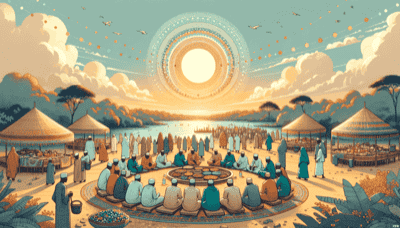We're here to help you keep count of the days to or since a date. Just click the button below and enter your chosen date to get started. Also choose the suggested days or search for a special day above #countingthedays

Eid al-Adha, also known as the Festival of Sacrifice, is one of the most significant Islamic festivals observed in Kenya, a nation with a substantial Muslim population. This religious holiday commemorates the willingness of Ibrahim (Abraham) to follow Allah's command to sacrifice his son. However, Allah provided a ram to sacrifice instead. The festival falls on the 10th day of Dhu al-Hijjah, the last month of the Islamic lunar calendar.
The history of Eid al-Adha is rooted in Islamic tradition and scripture, which recounts Prophet Ibrahim's trial. The celebration has been observed by Muslims around the world for centuries, including in Kenya where Islam has been present since the 8th century.
On this day, Kenyan Muslims start by performing morning prayers at mosques or open grounds known as Eidgahs. They dress in their finest clothing to signify the importance of this day.
Key practices include:
Sacrificial Slaughtering: Those who can afford it will sacrifice a permissible animal (usually a goat, sheep, cow or camel) as an act of Qurbani. This commemorates Ibrahim's readiness to sacrifice his son.
Sharing Meat: The meat from sacrificed animals is divided into three parts: one-third for the family, one-third for relatives and friends, and one-third for those in need.
Feasting: Families and friends gather to share meals and enjoy festive foods together.
Charity: An essential aspect of Eid al-Adha is giving charity (Zakat al-Fitr) to ensure that even the less fortunate can celebrate.
Social Gatherings: It's a time for visiting relatives and neighbors, exchanging gifts, and fostering community spirit.
In urban areas like Nairobi or Mombasa with denser Muslim populations, public celebrations are more visible. In rural areas, observances might be more private due to smaller Muslim communities. With modern influences and increased connectivity, it’s common for messages and well-wishes to be exchanged digitally among Kenyan Muslims during this period.
Eid al-Adha holds great cultural significance in Kenya as it not only strengthens community bonds but also reinforces the values of sacrifice and charity across diverse ethnic groups within its Muslim community.